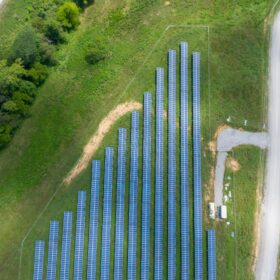California gas plant to be re-powered with batteries + solar
For the second time in a month a fossil fuel-fired power plant in California is set to be replaced by a battery powered by a solar, including distributed solar. A small portion of the former plant will be retained.
The billion-dollar battery boom
Corporations are buying up batteries and investing in their companies like it’s going out of style.
The bones of Skeleton Creek are coming together
NextEra has announced a power purchase agreement with Western Farmers Electric Cooperative for a combined 250 MW wind farm, 250 MWac solar farm, and 200 MW / 800 MWh of energy storage in Oklahoma.
Solar + batteries help the grid recover in Kaua’i
After experiencing cascading outages across its conventional fleet and cloudy weather impairing its solar output, the island is back on-line and solar and batteries are helping to meet demand while its largest power plant is being repaired.
ConEd shuts Brooklyn off, seeks 1.21+ gigawatt-hours of batteries
While the New York utility struggles with heatwave conditions, the group issues a request for proposals for 310 MW of energy storage power with at least four hours of capacity, with projects due to complete by the end of 2022.
Tri-State dumps coal, eyes wind and solar as new fling
Tri-State Generation and Transmission Association has announced it is creating an aggressive “Responsible Energy Plan,” one which begins with the retiring of the 100 MW Nucla Coal Plant in early 2020.
HB 6 sent back to House, Berkeley bans gas in new buildings: pvMB 7/18/19
Hello one and all and welcome to this morning’s edition of the pvMB. Today we’ll be tackling Renew Petra adding 100 MW to the U.S. annually, SimpliPhi adding capacity and lowering prices and more!
Sunrun gets a second contract to supply capacity from rooftop solar + batteries
A California Community Choice Aggregator has awarded Sunrun a contract to supply capacity from solar + storage on low-income housing. This follows on a similar deal in New England.
A pocket chart to maximize solar power deployment
Researchers have built a matrix outlining how solar power in various deployment models generates benefits greater than just clean electricity. This will help policy makers maximize energy decisions with limited resources.
The United States is headed for a battery breakthrough
A new report released by the U.S. Department of Energy projects that installed battery storage will reach 2.5 GW by 2023. Florida and New York are set to pave the way, as massive projects in each of those states will account for nearly half of the coming volume.















